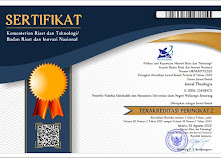IBN MISKAWAIH Filsafat al-Nafs dan al-Akhlāq
DOI:
https://doi.org/10.21580/teo.2014.25.1.344Abstract
Abstract: Ibn Miskawayh known not only in philosophy but also in other fields of scientific disciplines, such as history and Arabic literature. Even through one of his master piece, entitled Tahżīb al-Akhlāq wa Tatkhīr al-A’rāq name is becoming increasingly popular in many parts of the world. On this occasion the author deems it necessary to show the figure of Ibn Miskawayh by stressing his thoughts on the study of the study of nafs philosophy and morals. According to Ibn Miskawayh explained that between the soul and the sense that one is.That is the soul and intellectin his view can not be distinguished. Even sense to him it is one of the power of the forces that existin the soul and is a manifestation of the existence of the soul it self. Thus it can be said that there a son bagi¬nya is one proof for the existence of the soul. Abstrak: Ibn Miskawaih dikenal tidak hanya dalam bidang filsafatnya melainkan juga dalam bidang disiplin keilmuan lainnya, seperti sejarah dan sastra Arab. Bahkan melalui salah satu master piece-nya yang berjudul Tahżīb al-Akhlāq wa Tatkhīr al-A’rāq namanya menjadi semakin populer di berbagai belahan dunia. Dalam kesempatan ini penulis memandang perlu untuk menampilkan sosok Ibn Miskawaih ter¬sebut dengan stressing kajian pada telaah pemikirannya tentang filsafat al-nafs dan al-akhlak-nya. Menurut Ibn Miskawaih menerangkan bahwa antara jiwa dan akal itu satu adanya. Artinya jiwa dan akal dalam pandangan¬nya tidaklah dibedakan.Bahkan akal baginya justru merupakan salah satu daya dari daya-daya yang ada dalam jiwa dan merupakan manifestasi dari adanya jiwa itu sendiri. Dengan demikian dapatlah dikatakan bahwa akal bagi¬nya me¬rupakan salah satu bukti bagi adanya jiwa. Keywords: akhlak, filsafat, Yunani, al-nafs, al-akhlāqDownloads
References
Amin, Ahmad, Etika/Ilmu Akhlak,terj. Farid Ma’ruf, Jakarta: Bulan Bintang, 1986.
Daudy, Ahmad, KuliahFilsafat Islam, Jakarta: Bulan Bintang, 1986.
Madkur, Ibrahim, Filsafat Islam Metode dan Penerapan, terj. Yudian Wahyudi dan Ahmad Hakim al-Mudzakir,Jil. I, Jakarta: Rajawali, 1991.
Munawir, Ahmad Warson, al-Munawir Kamus Arab Indonesia, Yogyakarta: al-Munawir, 1984.
Mūsā, Muḥammad Yūsuf, Falsafah al-Akhlāq fī al-Islām,Kairo: Muassasah al-Khariji, 1963.
Nasution, Harun, FalsafatdanMistisismedalam Islam, Jakarta: Bulan Bintang, 1973.
Proyek Pembinaan Perguruan Tinggi Agama (PPPTA), Pengantar Filsafat Islam, Banda Aceh: IAIN Jami’ah Arraniri, 1983.
Ṣubḥī, Aḥmad Maḥmūd al-Falsafat al-Akhlāqiyah fī al-Fikri al-Islām,Mesir: Dār al-Ma’ārif, 1119 H.
Sudarsono, Etika Islam tentang Kenakalan Remaja, Jakarta: Bina Aksara, 1989.
Syarif, M.M., Para Filosof Muslim,terj. Ilyas Hasan, Bandung: Mizan, 1992.
Yunasril Ali, PerkembanganPemikiran Filsafat dalam Islam, Jakarta: Bumi Aksara, 1991.
Downloads
Issue
Section
License
The copyright of the received article shall be assigned to the journal as the publisher. The intended copyright includes the right to publish the article in various forms (including reprints). The journal maintains the publishing rights to the published articles.
Note: Authors are allowed to use their articles for any legal purposes deemed necessary without written permission.
Licensing

This work is licensed under a Creative Commons Attribution-ShareAlike 4.0 International License.
_______
Copyright Transfer Aggreement
In order for Jurnal Theologia to publish and distribute research articles, the editors need publishing rights (transferred from author to publisher). This agreement relates to the transfer/publishing copyright license to Jurnal Theologia but the authors still have significant rights to use and share their published articles.
Jurnal Theologia supports the need for writers to share, disseminate and maximize the impact of their research and their rights on any database. As a journal article writer, you have the right to various uses of your articles, including that by the institution or company where you work. Copyright can be used without the need for special permission. Authors who publish articles in the Jurnal Theologia have broad rights to use their work for teaching and scientific purposes without requesting permission, including:
- Use by the author for lectures, presentations, or conferences, with distribution of copies to participants;
- Distribution to colleagues for research use;
- Use in compilations of the author's subsequent work;
- inclusion in a thesis or dissertation;
- Reuse of sections or excerpts from articles in other works (with full acknowledgment of the final article);
- Preparation of derivative works (other than commercial purposes) (with full acknowledgment of the final article);
- Voluntary posting on open websites operated by authors’ or writers' agencies for scientific purposes
When submitting a manuscript, authors do so on the understanding that if accepted for publication, the copyright for publishing (publishing right) of the article shall be assigned/transferred to Jurnal Theologia.
Authors whose articles are accepted for publication will receive confirmation via email and sent a Copyright Transfer Agreement.














